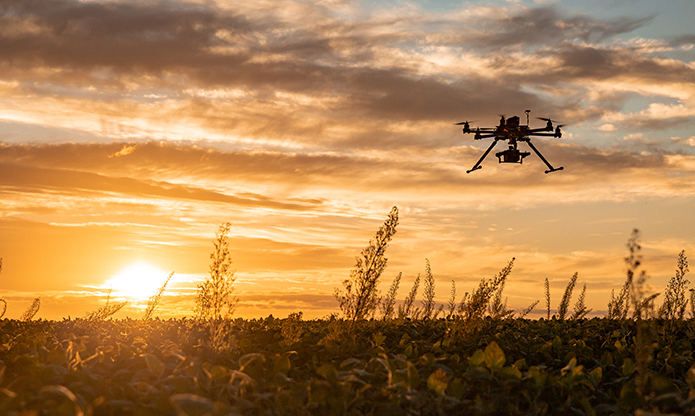An innovative research project based at Aarhus University aims to reduce the climate footprint of agriculture by using advanced technology and data-driven methods.
Agriculture has a complex and key role in the current climate crisis. For instance, a constantly growing world population requires increased food production, substantially burdening the environment. And applying nitrogenous fertiliser leads to many of the emissions in agriculture.
Nitrogen is essential for plant growth and has been applied for decades to increase productivity in agriculture. Unfortunately, undesirable environmental effects are also associated with its use.
Nitrogen pollution, which includes nitrogen loss into the atmosphere and leaching from the soil into watercourses and groundwater, poses a silent threat to our environment by contributing to climate change and damaging terrestrial and aquatic ecosystems.
Precision agriculture is one method that can reduce nitrogen pollution. This relatively new approach uses advanced technology to minimise resource waste and environmental impact in agriculture while optimising crop yield and efficiency.
Managing field variability
Aarhus University aims to become a leading global actor in precision agriculture based on the ambitious project ‘System-based Precision Agriculture for Sustainable Crop Production’. The Novo Nordisk Foundation has awarded a grant of up to DKK 25 million over the next five years for this project.
Professor Davide Cammarano from the Department of Agroecology at Aarhus University is leading the project and has followed the development of precision agriculture for the last 25 years. He has more than 20 years of experience within agriculture’s climate footprint and precision agriculture and is recognised as an international expert in the field through his work in Italy, Australia, the United Kingdom, and the United States.
According to Davide Cammarano, precision agriculture focuses on understanding and managing field variability, so that any agricultural input can be “applied in the right amount, at the right time and in the right place”, citing the late Pierre Robert, who was a pioneer within precision agriculture.
In this sense, agronomy (management of factors impacting yield) is central to precision agriculture. For example, soil nitrogen content varies not only between locations in a field but also over time.
“The focus is so much on spatial variability that temporal variability is seldom considered. If I measure nitrogen in the same piece of land today and tomorrow, the values will differ. Nitrogen varies substantially in time and place, which means that it is difficult to manage,” explains Davide Cammarano.
In the project, he wants to develop a framework for better integrating sensing and modelling for applying nitrogen in agricultural fields, minimising nitrogen loss into the environment while maintaining the quality and quantity of crops.
The project fieldwork will take place in an international consortium. In addition to Aarhus University, this involves researchers from the University of Copenhagen, Wageningen University & Research in the Netherlands and the Leibniz Centre for Agricultural Landscape Research in Germany.
Sensors, drones, and satellites in agriculture
The project will be carried out on various fields in Denmark. The fields will not be divided into parcels but rather managed following precision agriculture design. For example, having parts of the fields where precision techniques are implemented and where farming continues as usual.
In the project there will be collected data on soil conditions and plant growth and health by using sensors to collect soil data, drones for aerial photography and satellites to monitor plant health over time.
The researchers will comprehensively analyse these data both agronomically and mathematically. This will give farmers the opportunity to understand the maximum amount of fertiliser needed in different parts of the field, which will reduce the risk of excessive fertilisation and its environmental burden – and keep the same level of productivity. The data will provide a real-time up-to-date view of the state of crops and soil. This will allow us to adjust that in-season maximum amount of fertilizer (e.g. by lowering it to a given percentage).
In addition, Davide Cammarano will study nitrogen loss and greenhouse-gas emissions by using advanced measuring equipment. These measurements will elucidate how much nitrogen the plants absorb and how much is lost to the environment and the quantity of carbon dioxide released in each field.
“This will quantitatively measure whether precision agriculture really reduces the environmental burden and to what extent,” says Davide Cammarano.
Bridging the gap between research and agricultural practice
Although the project will primarily focus on applying nitrogen in agriculture, the aim is to gradually use some of the same techniques and models within precision agriculture for other purposes, such as reducing the application of pesticides.
Precision agriculture is an obvious area for the Novo Nordisk Foundation to support since it can have a decisive role in the transition to more sustainable methods of farming – especially in connecting the research involving the activity on individual farms.
“Using precision agriculture has great potential to reduce the environmental impact of farming systems while maintaining current crop yields. I hope and expect that the new project will bridge the gap between research and implementation on individual farms. The project can thus provide a solid basis for further research on and the development of precision agriculture – with Denmark as a focal point,” says Claus Felby, Senior Vice President, Biotech, Novo Nordisk Foundation.
For press-related inquiries:
Jakob Stein, Communications Specialist, Novo Nordisk Foundation, +45 30564940, [email protected]
For questions related to the project:
Thies Marten Heick, Scientific Manager, Novo Nordisk Foundation, +45 2078 2357, [email protected]
Davide Cammarano, Professor, Aarhus University, [email protected]









